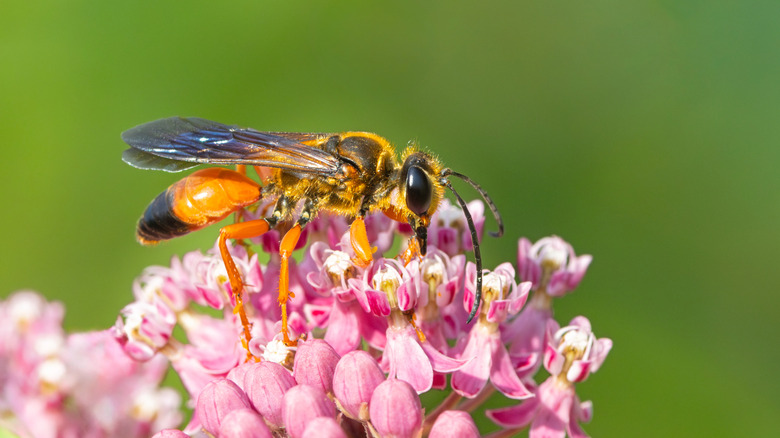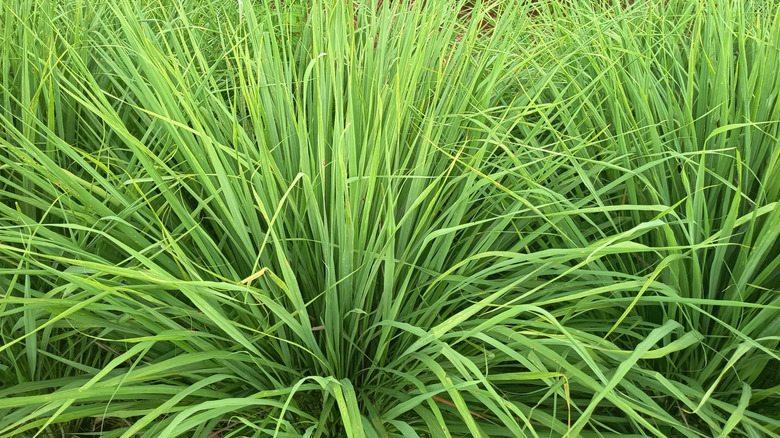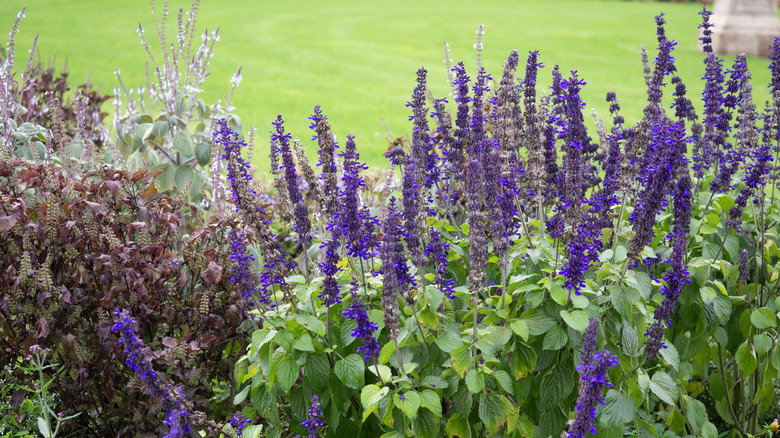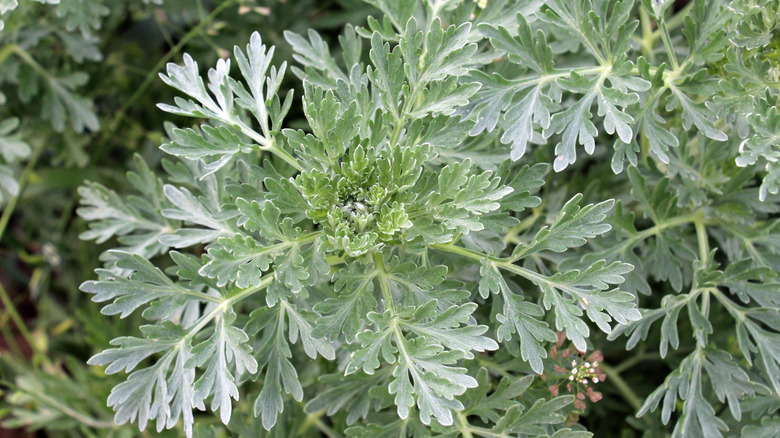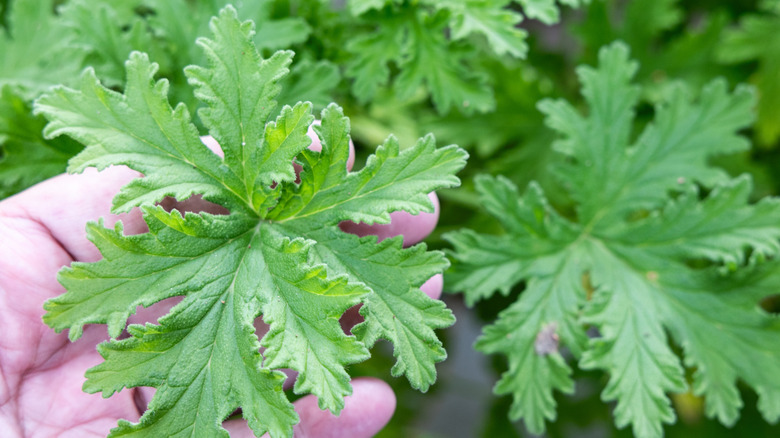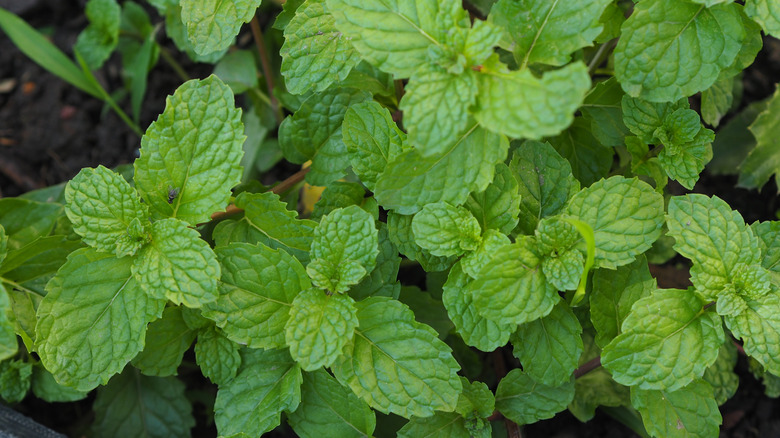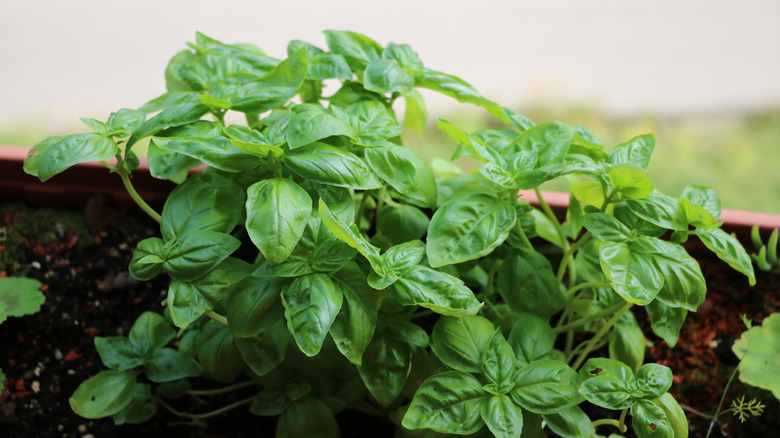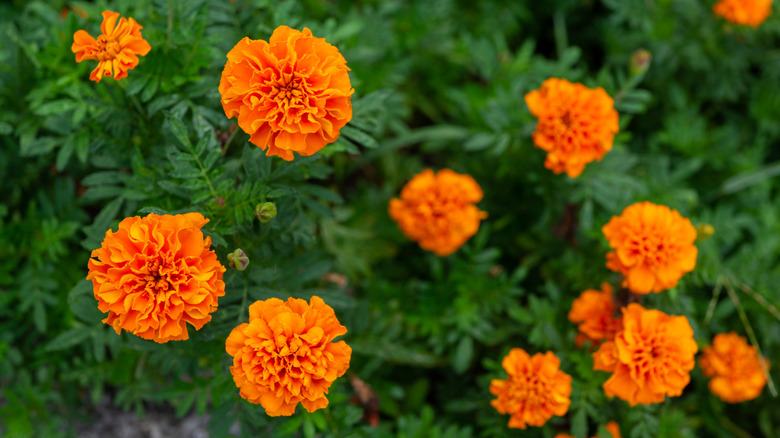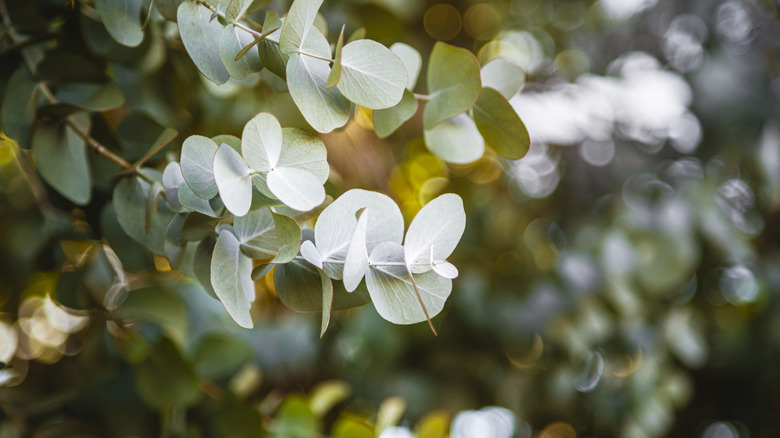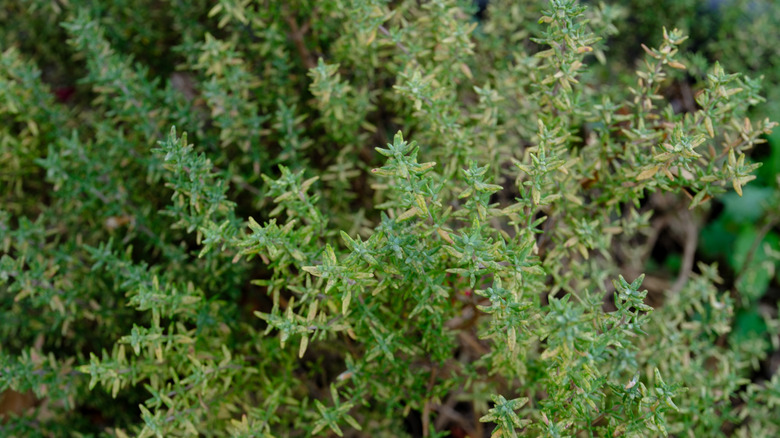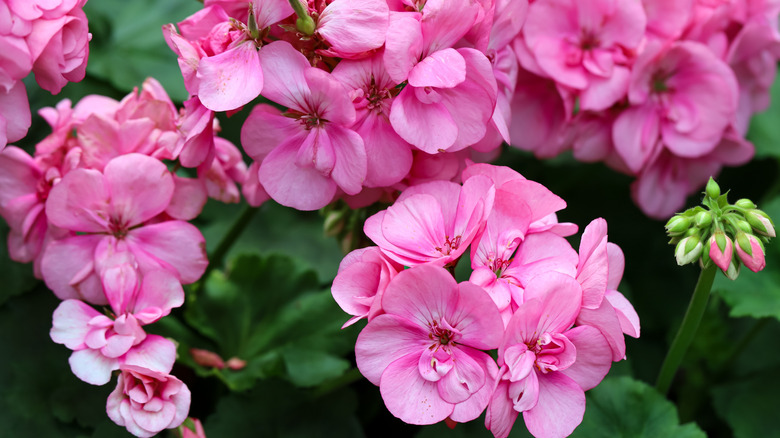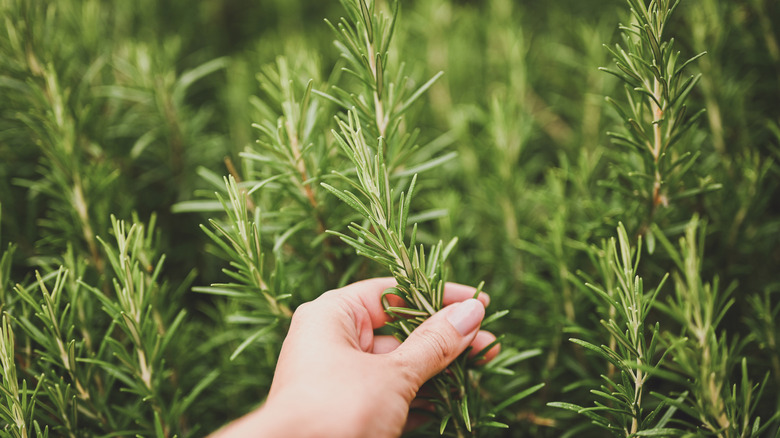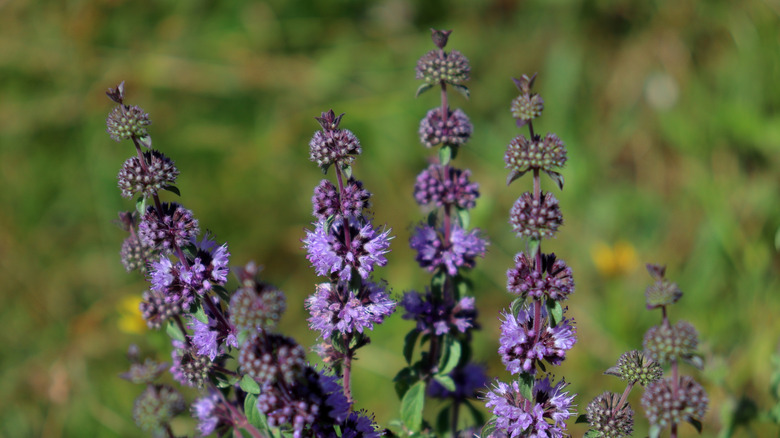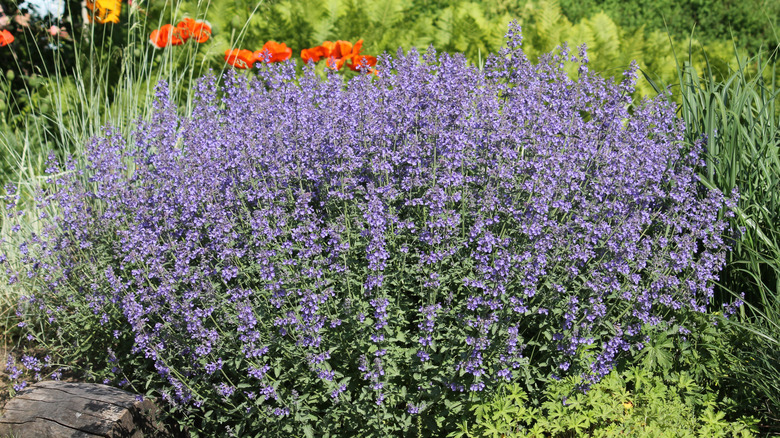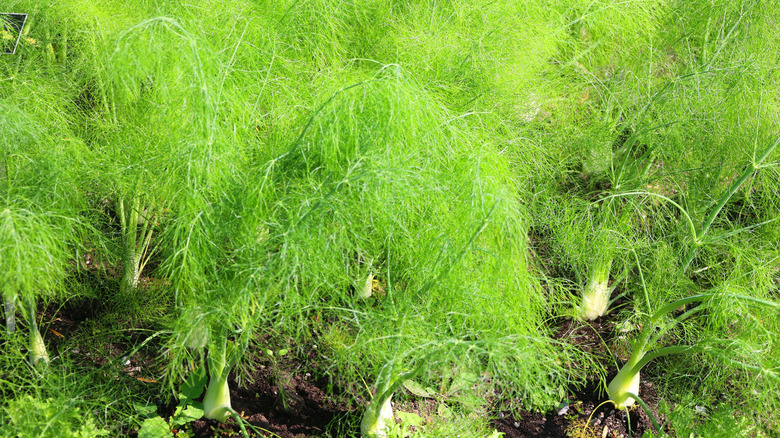14 Stunning Plants That Help Keep Wasps Out Of Your Yard
At best, wasps are a nuisance and at worst, a source of painful stings. While these insects do have benefits they offer to gardens, their stings are enough reason to not want them in your outdoor space, pollinators or not. You should know that, contrary to popular belief, they don't sting for no reason. Wasps are territorial insects that become aggressive when they feel threatened. Activities like barbecues and backyard games near a single wasp or, worse, a nest can easily set them off. Wasps also become more aggressive in the fall months as food becomes scarce.
If wasps are making your yard stressful instead of relaxing, there's a natural solution you can try to keep wasps at bay that will spruce up your space at the same time. The scent of many aromatic plants deters wasps and enhances the beauty of your yard. There is a wide variety to choose from, from flavorful herbs like basil and mint to flowering ornamentals like lavender and marigolds. Planting any of these 14 plants, or mixing and matching, is a great way to protect your lawn from these unwanted guests.
Lemongrass
Lemongrass (Cymbopogon spp.) produces a bright, citrusy scent that wasps hate. This clump-forming grass is perennial in zones 9 through 11. It prefers full sun and moist, loamy soil. Lemongrass grows to 2 to 4 feet tall, the perfect size to use as a simple green border. This plant's soft, yellow stalk can be used to flavor food. Its tougher leaves can be steeped into tea, which you can sip in your wasp-free yard.
Lavender
Lavender (Lavandula angustifolia) is known for its soothing scent, but the scent that's relaxing to us is undesirable to wasps. Plant these gorgeous flowers anywhere wasps tend to congregate. You can also dry the flowers or make your own essential oil to use in other areas of your yard. Lavender is perennial in zones 5 through 8. It requires full sun, well-draining soil, and pruning in the spring.
Wormwood
Wormwood (Artemisia absinthium) is a strongly scented plant known for its use in making absinthe. Wasps dislike its scent, and its light green, multi-pointed leaves add visual interest to a yard. You can also crush and scatter wormwood leaves anywhere you need a wasp repellent. Wormwood is perennial in zones 4 through 8. It requires full sun and dry to slightly moist soil. However, you should know that wormwood is considered invasive in some U.S. states, so check with your local extension office before planting.
Citronella grass
Citronella grass (Cymbopogon nardus) emits a citrusy scent that can mask the sweet smells that attract wasps, like that of fruit and flowers. This plant can grow up to 8 feet tall and 5 feet wide, so make sure you have the space. Citronella grass is perennial in zones 10 through 12. It should get full sun to partial shade and should be watered regularly. It's important to note that citronella grass is toxic to dogs, cats, and horses.
Mint
Mint (Mentha) has a sharp, icy scent that can deter wasps. You can also spread crushed mint leaves or hang sachets of dried mint leaves wherever you need a repellent. There are several varieties to choose from, like peppermint and spearmint, but most varieties are perennial in zones 5 through 9. Mint enjoys moist, rich soil and full to partial sunlight. Mint spreads quickly and can become a nuisance to surrounding plants. To keep it under control, consider planting it in containers or plant beds separate from your other plants.
Basil
Wasps hate Italian food. Ok, maybe not. But they certainly hate the strong aroma of basil (Ocimum basilicum). Basil doesn't tolerate cold well, so plant it after the last frost of the season. Plant your basil in moist, well-draining soil where it can receive full sun. Basil does well in the ground and containers, so you can have it wherever you need protection from wasps.
Marigolds
Marigolds (Tagetes) are sought after for their yellow, orange, and gold flowers. If you already love marigolds, you'll be happy to learn that their pungent scent also wards off wasps. Marigolds are relatively low-maintenance. Plant them in full sunlight, water when the soil becomes dry, and pinch off faded flowers to encourage new growth. The marigold's short stature and pretty golden blooms make it a perfect border plant for walkways and decks.
Eucalyptus
Eucalyptus is known for its refreshing menthol aroma and white flowers. Its essential oils are commonly used in natural insect repellents as the strong scent repels mosquitoes, flies, and wasps. If bugs won't stop, well, bugging you, why not grow your own tree? Eucalyptus is a perennial tree in zones 7 through 10. Plant it in well-draining soil where it can receive full sun. Eucalyptus is tolerant of drought once established. You can even make eucalyptus essential oil to use in your yard or home.
Thyme
Thyme (Thymus vulgaris) is another highly aromatic herb that deters wasps, with several varieties used for cooking and ornamental purposes. Thyme is a perennial plant in zones 5 through 9. As it only grows to about 15 inches tall, it can be used as ground cover, edging, and borders, as it can tolerate occasional foot traffic. Thyme does well in full sun and coarse, gritty soils.
Ivy leaf geranium
Wasps hate the scent of ivy leaf geranium (Pelargonium peltatum). In shades of red, pink, and purple, its flowers also bring a lively pop of color to your yard. These plants can be grown as perennials in zones 10 and 11, but are typically grown as annuals due to their cold sensitivity. They prefer full sun to partial shade, organically rich soils, and moderate moisture. At only 1 to 2 feet tall and wide, ivy leaf geraniums are perfect to border any area you want to keep wasps out, either in the ground, pots, or hanging baskets.
Rosemary
Rosemary (Salvia rosmarinus) is another common cooking herb whose strong, pine-like aroma repels wasps. With evergreen foliage and delicate purple or blue flowers that bloom from spring to summer, it's both an edible and ornamental addition to your yard. Rosemary is perennial in zones 8 to 10. It thrives in full sun and dry to moderately moist soils. Rosemary works well in containers, as a border plant, and as a stand-alone hedge.
Mountain pennyroyal
As a member of the mint family, mountain pennyroyal, coyote mint, or mountain monardella (Monardella odoratissima), emits a refreshing scent that wasps dislike. Mountain pennyroyals are perennial in zones 3 to 8. Plant them where they'll receive full to partial sun in dry to slightly moist, well-draining soil. These spiky purple flowers can be used as borders, low-growing ground cover, or in rock gardens. They are also an excellent choice for butterfly gardens.
Catnip
If you have cats, you've probably had a laugh watching them roll around in catnip (Nepeta cataria), but this plant is more than fun for cats. Another member of the mint family, this herb gives off a fresh aroma you can use to deter wasps. Catnip is perennial in zones 3 to 8. To successfully grow a catnip plant, give it full sun and dry soil. When it blooms, you can enjoy tiny white or purple flowers. If you're a cat lover, fewer wasps and more feline friends in your yard is a win-win.
Fennel
Fennel (Foeniculum vulgare) is an aromatic shrub that can help to deter wasps. Its feathery leaves and delicate yellow flowers make fennel a fun addition to a garden. Fennel is perennial in zones 4 to 9. It needs full sun and moist, organically rich soil. With proper care, it will bloom in mid-summer. Fennel self-spreads rapidly. To control the spread, remove any spent flowers before they produce seeds. It's important to note that fennel is invasive in California's coastal regions and grasslands.
